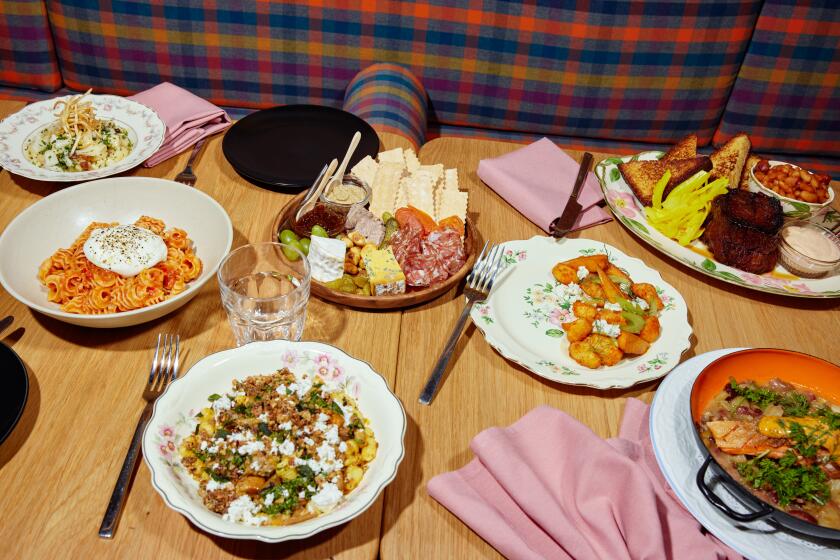Campanile closing? The dining scene loses a standard-setter

- Share via
The restaurant business is remarkably volatile, and anyone who has spent much time around it is used to seeing his or her favorites sputter out of business after good long runs. You grow up going to Angeli, you have your first date there, you become a regular when you get your first grown-up job, and — boom, it’s gone. Your favorite chef meets a payroll he can’t handle; your favorite bar turns into a shul. It’s sad, but it’s understood.
Still, I don’t think I’ve ever experienced as visceral a reaction as I did to the rumors — and, finally, the announcement — that Campanile was shutting down after 23 years, to be replaced by a Bill Chait-owned dining room with Walter Manzke behind the stoves. Chait has some fine restaurants, most notably Picca, Sotto and Rivera, and Manzke is one of the finest chefs ever to grace Los Angeles, but this is Campanile — a restaurant one idly dreams of introducing one’s unborn grandchildren to; the place ruled over for so long by its chef Mark Peel (and before that with Peel and then-wife Nancy Silverton, now of Mozza); a space, famously built by Charlie Chaplin as a present for his child bride, that seems destined to live as long as Los Angeles itself.
QUIZ: Jonathan Gold tests your knowledge of food and Islam
Former Village Voice critic Jeff Weinstein once called Campanile the last restaurant of the 1980s, by which he meant the last big, accessible, chef-run, frankly American space run as a sort of democracy of taste; places like the original Spago, Zuni in San Francisco and Gotham Bar and Grill in New York. A lot of great restaurants have opened since Campanile came online in 1989, but nothing since has been quite the same.
It is hard for me to be unbiased about the restaurant. In the few years of my adult life when I wasn’t formally working as a fine-dining critic — I was writing the Counter Intelligence column, then mostly about ethnic restaurants, for The Times — my wife and I ate dinner in the bar two or three times a week. I worked on a Campanile cookbook with Peel, and my wife co-wrote “Breads From the La Brea Bakery” with Silverton. We were married in the back room of the restaurant; our family and friends feasted on suckling pigs roasted in the bread oven, and the pastry kitchen’s Sumi Chang, who has owned Euro Pane in Pasadena for the last 15 years, baked a splendid chocolate wedding cake stuffed with Armagnac-soaked prunes. (I did review Campanile when it opened in 1989, before I met the chefs. But I never did write about the restaurant again. Peel and Silverton had that kind of effect on critics.)
It is hard to overstate Campanile’s contributions to American cooking. It wasn’t the first fine restaurant in the country to operate with a grill at its heart, but it codified the style, as well as the practice of reinterpreting simple dishes — steak and beans, Greek salad, fish soup — with first-rate ingredients and chefly virtuosity.
The whiff of wood smoke, the drizzle of slightly over-reduced stock and the smack of strong herbs are instantly identifiable as Peel’s signature. The very first menu included things like mozzarella made to order and lamb carpaccio with artichokes that still seem new 23 years later. Some of the restaurant’s dishes, including Niçoise salad with grilled tuna, lamb briefly smoked over smoldering rosemary branches, crisped penne, and sautéed fish laid over saucy puréed potatoes, caught on all over the world.
The wine program, founded by Manfred Krankl, who left to found the insanely well-regarded winery Sine Qua Non, introduced countless ultra-small-production California wines and cult Italian wines to Los Angeles and was among the first in the U.S. to recognize the new, high-quality whites coming from Austria.
In Campanile’s first years, every table was served an exquisitely seasonal plate of grilled vegetables that Peel himself drove up from Chino Farm in Rancho Santa Fe several times a week, which was the most direct farm-to-table connection in any American restaurant to that point and has still never quite been surpassed. Peel helped set up chicken and lamb operations in Sonoma County.
Campanile is where the grilled-cheese phenomenon started, weekly family dinners on off-nights and arguably the idea of pop-up restaurants-within-restaurants that has been so dominant in the last several years.
Silverton famously baked the bread herself, so well that the bakery, which grew from a few hundred square feet below the pastry kitchen to massive operations in Los Angeles and on the East Coast, eventually dwarfed the restaurant. Her rustically complex, generously salted pastries set the benchmark in America for decades — rustic pies, luxurious panna cotta, and huckleberry shortcake barely existed in fancy kitchens before she put them there.
The two chefs broke up several years ago, and when Silverton moved over to Mozza, the national spotlight followed her. Campanile for the first time in its existence became an old reliable, the kind of place where you knew you could probably pop in on a Saturday night without much notice; a restaurant where you could take an East Coast colleague for dinner when Cut seemed too over-the-top.
The urban rustic aesthetic had succeeded to the point that it essentially had become the lingua franca of California restaurants — not old-fashioned, exactly, but not different either.
But Peel is still the most exacting grill chef in the country, a master who plays his smoldering logs the way that Pinchas Zukerman does a Stradivarius. And every time I returned to the restaurant, usually following some downhill report or another, I was blown away once again by the details of execution — the exact temperature of every ingredient in the fish soup; the careful grilling of the rib-eye; the chewy-crisp texture of the sautéed pasta. Campanile, to its last day, remains one of the city’s best, and I can hardly wait to see what Peel is planning to do next.
More to Read
Eat your way across L.A.
Get our weekly Tasting Notes newsletter for reviews, news and more.
You may occasionally receive promotional content from the Los Angeles Times.











